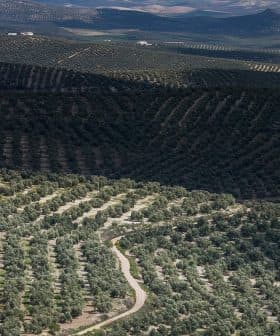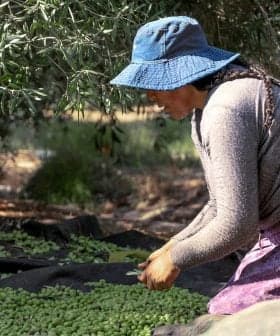As Value of Tunisian Exports Soar, Packaged Olive Oil Struggles

Tunisian olive oil export revenues have surged by nearly 90 percent, reaching 3.936 billion Tunisian dinars (€1.159 billion) between November 2024 and May 2024, with Spain as the leading destination. Despite the positive growth, the sector faces challenges such as low added value from bulk exports, prompting calls for more efficient production and export systems to capitalize on the exceptional quality of Tunisian olive oil.
Tunisian olive oil export revenues rose by nearly 90 percent in the first seven months of the 2023/24 crop year compared to the same period in 2022/23, according to the National Observatory of Agriculture (Onagri).
North Africa’s largest olive oil-producing nation exported 3.936 billion Tunisian dinars (€1.159 billion) between November 2024 and May 2024. Similarly, export volumes increased by more than 12 percent to 148,700 tons.
Transitioning to bottled oil sales could increase added value and foreign exchange earnings, positioning Tunisia as a leading global market for olive oil production and export.
According to Donia Sfar, the export manager of Tesoro del Rio, Tunisia’s substantial increase in oil export revenues can be attributed to demand exceeding supply in the past two crop years and the surge in global olive oil prices. However, prices have come down from mid-January record highs.
“The significant rise in sales has resulted in substantial profits for the state, particularly in terms of foreign exchange,” she told Olive Oil Times. “The value of olive oil exports is experiencing impressive growth due to the increasing global demand.”
See Also:Tunisian Ag Minister Urges Sector to Take Advantage of Bumper Harvest“This success has motivated the authorities to develop the sector further and expand the agricultural lands dedicated to olive oil production,” she added.
Sfar also cited growing awareness of Tunisian olive oil as another reason for increasing sales from the North African country. Tunisian producers recently earned 26 awards at the 2024 NYIOOC World Olive Oil Competition. Sfar’s company was among the winners.
Onagri data show that Spain is the leading destination for Tunisian olive oil, with 47.4 percent flowing to Spanish ports, followed closely by Italy at 42.2 percent and the United States in third at 33.8 percent.
The observatory further reported that organic olive oil sales totaled 32,589 tons valued at 881 million Tunisian dinars (€259 million), representing 21.9 percent of the total volume and 22.2 percent of the value.
Despite the positive growth in olive oil exports, Tunisia’s olive oil sector faces constraints, such as low added value from bulk exports and high levels of bureaucracy for producing, packaging and exporting olive oil.
Onagri data show that packaged olive oil exports were less than five percent of total organic olive oil exports, with Italy (51 percent), Spain (31 percent) and France (12 percent) as the main destinations.
“Despite these positive indicators, exporters are currently facing difficulties, particularly in relation to extended deadlines and complex procedures,” she said. “As a result, they are urging the authorities to intensify their efforts to eliminate these obstacles.”
“Additionally, industry experts recommend establishing a highly efficient production and export system, with the aim of becoming the leading global market for olive oil and capitalizing on the exceptional quality of Tunisian olive oil,” Sfar added.
Sfar believes the primary weakness of Tunisia’s olive oil markets is that most exports are in bulk, to be blended, bottled and re-exported by European countries, which capture a larger share of the profits.
See Also:Leading Tunisian Bulk Olive Oil Exporter Pivots to Adding Value“Eighty percent of exports are in bulk, resulting in various economic and commercial disadvantages,” she said. “Certain Tunisian oils are packaged and sold under different European brands.”
“Furthermore, exporting olive oil in bulk leads to a loss of added value and foreign exchange earnings,” Sfar added.
Despite the government’s efforts to promote individually packaged exports, Sfar said the current trade paradigm had prevented Tunsiains from reaping the full benefits of higher olive oil prices that come with bottling, labeling and marketing a branded olive oil.
“These activities not only create employment opportunities but also enhance the value of the end product and bolster Tunisia’s reputation as a prominent player in the olive oil production and export market,” she said.
“Transitioning to bottled oil sales could increase added value and foreign exchange earnings, positioning Tunisia as a leading global market for olive oil production and export,” Sfar added.
Although most products were sold in bulk, new companies have entered the market selling their products in bottles.
“The problem is, it is difficult for these companies to find packaging, and even if they do, it is expensive,” Sfar said. “As a result, they may struggle to compete unless they target the high-end market.”
Sector officials anticipate rising costs for olive oil producers, with prices currently ranging between 2 and 5.7 Tunisian dinars (€0.59 to €1.68) per kilogram.
As Tunisia continues to navigate challenges and opportunities in the olive oil industry, Sfar concluded that strategic investments in packaging, marketing and value-added production are essential for sustained growth and competitiveness on the global stage.









